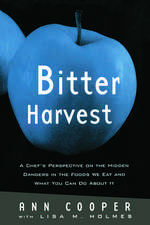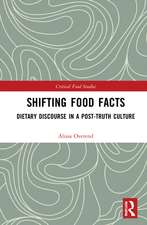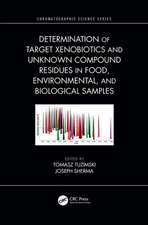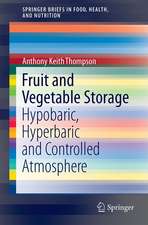Kinetic Modeling of Reactions In Foods: Food Science and Technology
Autor Martinus A.J.S. van Boekelen Limba Engleză Hardback – 18 dec 2008
Illustrating how kinetic modeling can predict and control food quality from farm to fork, this authoritative resource:
- Applies kinetic models using general chemical, physical, and biochemical principles
- Introduces Bayesian statistics in kinetic modeling, virtually unchartered territory in the food science field
- Integrates food science, kinetics, and statistics to predict and control food quality attributes using computer models
- Uses real-world examples rather than hypothetical data to illustrate concepts
Din seria Food Science and Technology
- 25%
 Preț: 618.61 lei
Preț: 618.61 lei - 22%
 Preț: 1024.09 lei
Preț: 1024.09 lei -
 Preț: 357.24 lei
Preț: 357.24 lei - 22%
 Preț: 842.01 lei
Preț: 842.01 lei - 23%
 Preț: 553.64 lei
Preț: 553.64 lei - 15%
 Preț: 489.26 lei
Preț: 489.26 lei - 18%
 Preț: 1359.95 lei
Preț: 1359.95 lei - 18%
 Preț: 1674.26 lei
Preț: 1674.26 lei - 8%
 Preț: 323.02 lei
Preț: 323.02 lei - 30%
 Preț: 614.87 lei
Preț: 614.87 lei - 18%
 Preț: 2090.27 lei
Preț: 2090.27 lei - 15%
 Preț: 489.26 lei
Preț: 489.26 lei - 29%
 Preț: 1408.52 lei
Preț: 1408.52 lei - 23%
 Preț: 566.29 lei
Preț: 566.29 lei - 13%
 Preț: 385.35 lei
Preț: 385.35 lei - 15%
 Preț: 498.42 lei
Preț: 498.42 lei - 30%
 Preț: 2111.13 lei
Preț: 2111.13 lei - 18%
 Preț: 2081.08 lei
Preț: 2081.08 lei - 18%
 Preț: 2212.49 lei
Preț: 2212.49 lei - 18%
 Preț: 2220.38 lei
Preț: 2220.38 lei - 18%
 Preț: 2221.95 lei
Preț: 2221.95 lei - 23%
 Preț: 606.02 lei
Preț: 606.02 lei - 18%
 Preț: 2078.06 lei
Preț: 2078.06 lei - 23%
 Preț: 415.15 lei
Preț: 415.15 lei - 18%
 Preț: 2102.06 lei
Preț: 2102.06 lei - 23%
 Preț: 376.17 lei
Preț: 376.17 lei - 18%
 Preț: 1604.01 lei
Preț: 1604.01 lei - 18%
 Preț: 2770.03 lei
Preț: 2770.03 lei - 18%
 Preț: 1313.74 lei
Preț: 1313.74 lei - 15%
 Preț: 537.13 lei
Preț: 537.13 lei - 18%
 Preț: 2211.41 lei
Preț: 2211.41 lei - 18%
 Preț: 2233.32 lei
Preț: 2233.32 lei - 27%
 Preț: 1420.06 lei
Preț: 1420.06 lei - 18%
 Preț: 1395.65 lei
Preț: 1395.65 lei - 31%
 Preț: 1702.47 lei
Preț: 1702.47 lei - 18%
 Preț: 1926.00 lei
Preț: 1926.00 lei - 29%
 Preț: 1409.34 lei
Preț: 1409.34 lei - 18%
 Preț: 1800.14 lei
Preț: 1800.14 lei - 18%
 Preț: 1336.46 lei
Preț: 1336.46 lei - 18%
 Preț: 1959.17 lei
Preț: 1959.17 lei - 26%
 Preț: 1690.48 lei
Preț: 1690.48 lei - 22%
 Preț: 836.17 lei
Preț: 836.17 lei - 18%
 Preț: 1941.91 lei
Preț: 1941.91 lei - 18%
 Preț: 1222.82 lei
Preț: 1222.82 lei - 18%
 Preț: 701.01 lei
Preț: 701.01 lei
Preț: 1827.77 lei
Preț vechi: 2228.98 lei
-18% Nou
Puncte Express: 2742
Preț estimativ în valută:
349.73€ • 365.16$ • 289.46£
349.73€ • 365.16$ • 289.46£
Carte tipărită la comandă
Livrare economică 04-18 aprilie
Preluare comenzi: 021 569.72.76
Specificații
ISBN-13: 9781574446142
ISBN-10: 1574446142
Pagini: 786
Ilustrații: 447 Illustrations, black and white
Dimensiuni: 178 x 254 x 43 mm
Greutate: 1.54 kg
Ediția:1
Editura: CRC Press
Colecția CRC Press
Seria Food Science and Technology
ISBN-10: 1574446142
Pagini: 786
Ilustrații: 447 Illustrations, black and white
Dimensiuni: 178 x 254 x 43 mm
Greutate: 1.54 kg
Ediția:1
Editura: CRC Press
Colecția CRC Press
Seria Food Science and Technology
Public țintă
ProfessionalCuprins
Kinetic View on Food Quality. The Basics. Application of the Basics to Chemical, Biochemical, Physical, and Microbial Changes in the Food Matrix. Appendix A Some Calculus Rules. Appendix B Ways to Express Amounts of Reactants and Products. Appendix C Interconversion of Activity Coefficients Based on Mole Fractions, Molalities, and Molarities. Appendix D Differential and Integrated Rate Equations for Kinetic Models of Complex Reactions. Appendix E McMillan–Mayer and Lewis–Randall Framework and Equations for the Mean Spherical Approximation Theory. Appendix F Probability Laws and Probability Models. Appendix G Use of Matrix Notation in Model Representation and Regression Analysis. Appendix H Some Thermodynamic Activity Coefficient Models. Appendix I Reliability Engineering and the Weibull Model. List of Symbols and Units. Index.
Recenzii
"The book is a spectacular accomplishment and a result of monumental work. Well done and timely. Congratulations to the author. It is wonderful to have a comprehensive collection of kinetic models, lucid analyses and data in both tabulated and graphical forms, all in one volume!"
—Micha Peleg, Ph.D., University of Massachusetts, Amherst, USA
" … a welcome addition to the food chemistry and food science literature. … the author presents the material in a thoughtful and engaging manner. Importantly, the book is quite well-referenced, making relatively easy to find supplemental material when desired."
—Journal of Chemical Education
—Micha Peleg, Ph.D., University of Massachusetts, Amherst, USA
" … a welcome addition to the food chemistry and food science literature. … the author presents the material in a thoughtful and engaging manner. Importantly, the book is quite well-referenced, making relatively easy to find supplemental material when desired."
—Journal of Chemical Education
Descriere
Kinetic Modeling of Reactions in Foods: Modeling of Food Quality Attributes provides an introduction to kinetic models and modeling techniques and their applications in food science and technology. This book argues that the modeling of food changes is kinetic modeling. Integrating food science knowledge, kinetics, and statistics, it explores the potential to predict and control food quality attributes with computer models. It presents applications of kinetic models using general chemical, physical, and biochemical principles. It also includes an introduction to Bayesian statistics in kinetic modeling. The text illustrates concepts using real-world examples rather than hypothetical data.




















